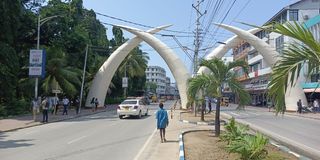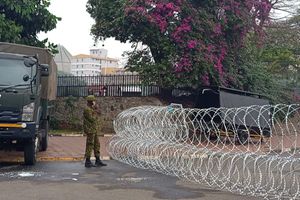
The famous elephant tusks in Mombasa, a common starting point for demonstrations, was deserted most of the day on July 7, 2025.
At the busy intersection known as Saba Saba in Mombasa City, life moves on as usual as matatus honk, vendors hawk their wares and pedestrians weave through traffic.
But few stop to consider the origin of the place’s name. Yet, behind the casual bustle lies a deep connection to one of Kenya’s most pivotal moments in its fight for democracy.
Whether named after a Tanzanian holiday, a local pub or in tribute to the July 7, 1990 protests that ignited the push for multiparty democracy, Saba Saba remains a symbol, especially this time of year of Kenya’s enduring struggle for civil liberties and political reform.

Business as usual in Mombasa on July 7, 2025, as Saba Saba protests erupt in parts of the country.
On that day in 1990, thousands of Kenyans took to the streets in defiance of President Daniel arap Moi's one-party regime, demanding political pluralism and civil liberties. The date became a watershed moment in Kenya’s journey toward multiparty democracy.
Though the epicentre of the 1990 protests was Nairobi's Kamukunji Grounds, the spirit of resistance resonated across the country.
In Mombasa, this key road intersection which connects the Central Business District to Ronald Ngala Road towards Nyali Bridge and Jomo Kenyatta Avenue towards Makupa Causeway stands out at the mention of Saba Saba.
Some residents say the road was named to commemorate the events of July 7, 1990. However, others believe the place got its name from a pub known as Saba Saba, located at a corner of the intersection. Yet others, especially from the older generation, believe the name originated from the Dar es Salaam International Trade Fair Day, a Tanzanian public holiday that commemorates the founding of the Tanganyika African National Union (TANU) in 1954.
“I have never given it much thought but I don't recall this place ever having another name. It has always been Saba Saba since the 1970s,” said Mr Abdulrahman Abdalla, 75, a Mombasa resident.
His views are supported by Mr Ibrahim Khamis, also 75, who recalled how they used to converge at Saba Saba to campaign for the then Kanu political stalwart, the late Shariff Nassir, even before the 1990 pro-reform demonstrations.
According to Mr Khamis who is the Kanu Majengo Ward Chairman, the bar located at that intersection was owned by a Tanzanian who named it Saba Saba in reference to events in his home country. “It is the bar that gave this location its name. Therefore, the area's name has its roots in Tanzania's history,” he said.
Once popular as a red-light district, the area has evolved over the years into a hub of trade, public transit and social life.

Heavy security at Mombasa Mall on July 7, 2025.
Regardless of its origin, organisers of Monday's Saba Saba demonstrations in Mombasa chose to highlight the significance of the area in preserving the legacy of Kenya’s democratic struggle.
They planned to begin their processions at this intersection, a departure from past traditions where most demonstrations started at the iconic 'Elephant Tusks'.
“Saba Saba is not just an intersection but a very strategic place. In our last protests, the police wanted us to reroute but we stood our ground and we hope there will be no interference this time,” said Muslims for Human Rights (Muhuri) board member Khelef Khalifa.
Each year, Saba Saba Day is marked by rallies, debates and street demonstrations across the country.
Mombasa and the Coast region have historically played a role in the fight for democratic rights.
In the past, veteran politicians openly called for majimbo (devolution) believing it would address historical injustices related to education, employment, land ownership and equitable distribution of national resources.
Today, youthful activists are still fighting against many of these challenges, including corruption and human rights abuses, blaming the situation on poor leadership.
“It is strange that in this day and age police are still disrupting demonstrations that are constitutionally protected. This is simply dictatorship. Today, it's the people who have power, not the leaders," said Muhuri’s Rapid Response Officer Francis Auma.
The activists were summoned by police on Saturday.
Mr Auma said they were questioned for about eight hours for planning the demonstrations, which police barred citing security concerns.
By 10am there were no protests in Mombasa, with minimal activity within the CBD.






